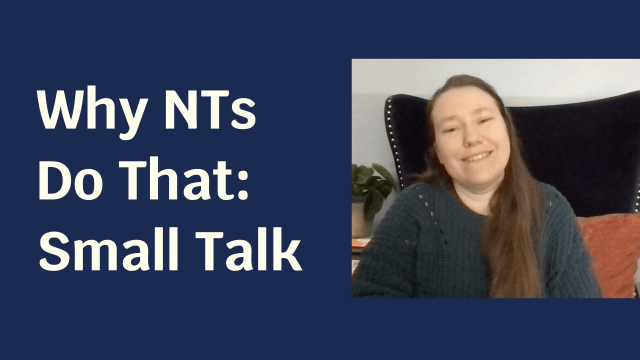
What’s the use of this style of communication?
One of the differences that I often see when neurotypicals and autistics try to interact is that they approach the beginning of an interaction very differently. Autistic people tend to have very little tolerance for small talk or surface level conversations, they want to get really deep into things. That’s not universal, people are different, but that tends to be pretty common.
Neurotypicals often actually do enjoy these deeper conversations, but it takes them a while to feel safe enough with someone to open up to that. They use small talk to develop that feeling of safety with another person. It’s like how if you want to jump into a hot tub:
You can jump right in, but that might be a shock to your system, and you might feel like you’re going to burn or suffocate. If you wane in slowly, you can tolerate the heat because your system has time to get used to the environment. To recognize that you’re really okay, that you’re not going to burn. That you can handle the heat and the humidity because you have time to slowly adjust, even as you’re getting hotter and hotter.
Getting used to you
When people talk about the weather, sports, their trip getting there, or other minor things, and you respond to them positively, they start to trust that they can feel safe around you. At least at that level. Then they might open up a little bit more about how their family is doing. Maybe some work things that are troubling them, their plans for the next trip, or something like that.
This is the process of waning in and testing the waters a little bit at a time, they’re getting used to feeling safe around you.
If you respond with acceptance and interest to those types of things, they can feel a little bit more safe around you. Then they might try revealing one thing that’s more personal, something that they care about more. Possibly a political view, a hope for a better future, or childhood memory. Something that’s more personal and meaningful to them. If you respond to that with interest or curiosity, and acceptance, they’ll feel more safe and be able to open up with you about even more deep things.
This is the process of waning in and testing the waters a little bit at a time, they’re getting used to feeling safe around you. Some people need this time and reciprocity around things that don’t broach emotional barriers, so they can feel safe enough with someone to be able to talk about the deeper stuff.
However, when autistics don’t understand what’s happening, we often see these interactions as a complete waste of time and we disengage. We’re leaving the interaction before it gets to the point where we can have exactly the kinds of conversations that we want.
A different style
The autistic style, though, tends to be different. We tend to want to cannonball into the hot tub, by which I mean the conversation, and we often end up splashing hot water all over the people around us. We’ll often make a grand pronouncement, or state an opinion very pointedly, and we often don’t notice the emotional reactions of the people around us.
If they’re surprised or they disagree, we try to follow up with a thorough and cogent explanation for the way that we see things. Why we do that is that we’re looking to see if someone has a compatible view of the world, or at least if they can engage with the depths of the complexity of thought that we want from others.
What’s happening here is not that either style is right or wrong, it’s just that they’re not understanding the other style.
So when you try to go really deep into talking about something that’s deeply personal (like what’s happening in your life, philosophical ideals or changing the system, big things like that): neurotypicals don’t feel safe, so they try to disengage. What’s happening here is not that either style is right or wrong, it’s just that they’re not understanding the other style.
When autistics don’t understand that neurotypicals need a slow wane in order to feel safe, but instead write them off, then they don’t get the advantages of all that their relationships have to offer. When neurotypicals don’t understand that autistics are seeking someone who shares a compatible worldview, and we’re simply pursuing the most efficient way to figure out whether you’re compatible or not, they call us rude and miss out on all of the advantages that our relationships have to offer.
Last thought
One last thought: Some people can stay at those surface level conversations seemingly forever. When that happens, it’s probably an indication that they are genuinely not feeling safe enough emotionally to go any deeper. That might not have anything to do with you. In fact, it’s far more likely that that’s about what’s happened to them in their past.
I hope that this is a helpful explanation as to why small talk is important to some people and why other people try to bypass it.




